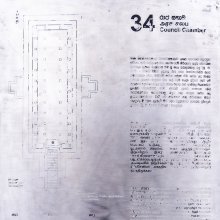Paranc, Parāk, Parak, Parāñc: 9 definitions
Introduction:
Paranc means something in Hinduism, Sanskrit. If you want to know the exact meaning, history, etymology or English translation of this term then check out the descriptions on this page. Add your comment or reference to a book if you want to contribute to this summary article.
Alternative spellings of this word include Paranch.
Images (photo gallery)
Languages of India and abroad
Sanskrit dictionary
Source: DDSA: The practical Sanskrit-English dictionaryParāñc (पराञ्च्).—a. (-cī f.)
1) Situated beyond or on the other side; ये चामुष्मात् पराञ्चो लोकाः (ye cāmuṣmāt parāñco lokāḥ) Ch. Up; दिग्देश- कालवचनो हि पराक्शब्दो भवति (digdeśa- kālavacano hi parākśabdo bhavati) ŚB. on MS.1.5.47.
2) Having the face turned away; आत्मीयास्ते ये पराञ्चः पुरस्तात् (ātmīyāste ye parāñcaḥ purastāt) (parāṅmukha); Śiśupālavadha 18.18.
3) Unfavourable, adverse; दैवे पराचि (daive parāci) Bv.1.15; or दैवे पराग्वदनशालिनि हन्त जाते (daive parāgvadanaśālini hanta jāte) 3.1.
4) Distant.
5) Directed outwards; पराङ् पश्यति नान्तरात्मन् (parāṅ paśyati nāntarātman) Kaṭh.2.1.1; Bhāgavata 8.19.9.
6) Turned away, averted.
7) Departing or returning from.
8) Inverted, reversed.
9) Not repeated; अनभ्यासे पराक्शब्दस्य तादर्थ्यात् (anabhyāse parākśabdasya tādarthyāt) MS.1.5.45; अनभ्यासे पराक्शब्दो वर्तते (anabhyāse parākśabdo vartate) ŚB. On MS. 1.5.45. -n. The body; यदात्मानं पराग्गृह्य पशुवद्भूतवैशसम् (yadātmānaṃ parāggṛhya paśuvadbhūtavaiśasam) Bhāgavata 4.11.1.
-ind. 1) Away, off.
2) Outwards.
See also (synonyms): parāc.
—— OR ——
Parāk (पराक्).—See पराच् (parāc); पुनरासाद्य संरब्ध उपक्रोष्टा पराक् स्थितः (punarāsādya saṃrabdha upakroṣṭā parāk sthitaḥ) Bhāgavata 1.15.31.
Source: Cologne Digital Sanskrit Dictionaries: Shabda-Sagara Sanskrit-English DictionaryParāk (पराक्).—ind. Crooked, crookedly. E. parā away, ac to go, aff. kvip.
Source: Cologne Digital Sanskrit Dictionaries: Shabda-Sagara Sanskrit-English DictionaryParāñc (पराञ्च्).—or parāc mfn. (parāṅ parācī parāk) Turned away, inverted, reversed. E. parā away, añc to go, aff. kvin.
Source: Cologne Digital Sanskrit Dictionaries: Benfey Sanskrit-English DictionaryParāñc (पराञ्च्).—i. e. parā-añc, adj., f. ācī. 1. Turned away, [Bhāgavata-Purāṇa, (ed. Burnouf.)] 4, 11, 10. 2. Distant, 5, 5, 31.
Source: Cologne Digital Sanskrit Dictionaries: Cappeller Sanskrit-English DictionaryParāñc (पराञ्च्).—([feminine] parācī, [neuter] parāk & parān) directed away, averted, opposite to, turning from ([ablative]), behind or after one another, following upon ([ablative]); departed, lost; turned outwards (the organs of sense); [neuter] [adverb]
Source: Cologne Digital Sanskrit Dictionaries: Monier-Williams Sanskrit-English Dictionary1) Parāk (पराक्):—a parāka etc. See parāñc.
2) Parāñc (पराञ्च्):—mfn. ([from] 2. añc; [nominative case] āṅ, ācī, āk, or āṅ) directed or going away or towards some place beyond (opp. to arvāñc)
3) turned away, averted, distant, turning from, being beyond or outside of ([ablative]), not returning, done away with, gone, departed, [Ṛg-veda; Atharva-veda; Taittirīya-saṃhitā; Brāhmaṇa; Upaniṣad]
4) having any one behind
5) standing or going behind one another, following ([ablative]), [ib.]
6) directed outwards or towards the outer world (as the senses), [Kaṭha-upaniṣad; Bhāgavata-purāṇa]
7) n. the body, [Bhāgavata-purāṇa iv, 11, 10]
8) Parāk (पराक्):—[from parāñc] b ind. away, off, [Kātyāyana-śrauta-sūtra; Aitareya-upaniṣad]
9) [v.s. ...] ind. outwards, towards the outer world, [Kaṭha-upaniṣad; Bhāgavata-purāṇa]
10) [from parāñc] c in [compound] for rāñc.
Source: Cologne Digital Sanskrit Dictionaries: Yates Sanskrit-English DictionaryParāk (पराक्):—adv. Crookedly.
[Sanskrit to German]
Sanskrit, also spelled संस्कृतम् (saṃskṛtam), is an ancient language of India commonly seen as the grandmother of the Indo-European language family (even English!). Closely allied with Prakrit and Pali, Sanskrit is more exhaustive in both grammar and terms and has the most extensive collection of literature in the world, greatly surpassing its sister-languages Greek and Latin.
See also (Relevant definitions)
Starts with (+6): Parakpushpi, Paramcata, Paramciya, Paramciya, Paran-cotimunivar, Paranca, Parancana, Parancattu, Paranch, Paranci, Paranci Gadi, Paranci Ushi, Paranci-gadi, Paranci-ushi, Parancika, Parancin, Parancita, Parancoli, Parancoti, Parancutar.
Full-text (+18): Parakpushpi, Paraktva, Paracina, Paraka, Paragvasu, Paranmukhatva, Paranmukhata, Paragdrish, Paranmukha, Parak-bang-ham, Parag, Paraci, Paran, Paracais, Paranmukham, Parancin, Parakattat, Parancana, Paranmukhikri, Paracikarman.
Relevant text
Search found 5 books and stories containing Paranc, Parāk, Parak, Parāñc; (plurals include: Parancs, Parāks, Paraks, Parāñcs). You can also click to the full overview containing English textual excerpts. Below are direct links for the most relevant articles:
Shrimad Bhagavad-gita (by Narayana Gosvami)
Verse 4.41 < [Chapter 4 - Jñāna-Yoga (Yoga through Transcendental Knowledge)]
Satapatha-brahmana (by Julius Eggeling)
Kāṇḍa IV, adhyāya 2, brāhmaṇa 5 < [Fourth Kāṇḍa]
Yoga Vasistha [English], Volume 1-4 (by Vihari-Lala Mitra)
Chapter XVIII - The incarnation of the living spirit < [Book IV - Sthiti prakarana (sthiti prakarana)]
The Sarva-Darsana-Samgraha (by E. B. Cowell)
